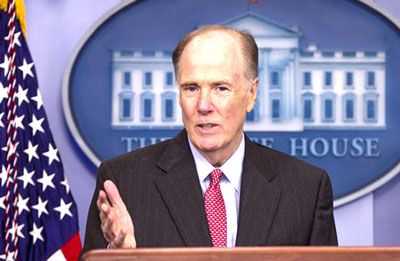
Shale boom 'boosts US clout in world affairs'
New York, April 25, 2013
The boom in domestic oil and gas production has strengthened the hand of the US in global affairs and is having a profound impact on the country's security and foreign policy, President Barack Obama's national security advisor said.
In his first major speech on energy policy, Tom Donilon said the unexpected growth in oil and gas production has created jobs and made the US economy stronger, giving the US new leverage in its dealings with other countries.
"Our strength at home is critical to our strength in the world, and our energy boom has proven to be an important driver for our economic recovery," Donilon said in a speech at Columbia University's new Center on Global Energy Policy.
Innovative use of hydraulic fracturing, or "fracking," has freed new supplies of oil and gas trapped in shale rock, putting the United States in line to become the world's largest oil producer by 2017, surpassing Saudi Arabia.
After 40 years of believing US energy supplies were inevitably shrinking, leaving the United States more reliant on foreign oil, there has been a dramatic shift in the "mindset" about the issue, Donilon said.
"We are just beginning to understand and appreciate the geostrategic impacts of these changes," said Donilon, noting he deals with energy policy issues on a near-daily basis.
The growth in US production helped the United States lead efforts to apply economic sanctions on Iran over its nuclear program. The sanctions slashed Iran's oil exports and hurt its economy without leading to an oil price spike that could have hurt the world economy, Donilon said.
Donilon made it clear that even though the United States might rely less on oil from the Middle East, it will not "disengage" from working with countries there to advance peace and stability.
"We have a set of enduring national security interests in the Middle East," he said.
The US also hopes to play a diplomatic role in helping ease tensions in the South and East China Seas between China and smaller Asian nations that are stoked by potential offshore oil resources, Donilon said, noting the administration "firmly opposes coercion or the use of force to advance territorial claims."
Donilon did not tip the administration's hand on how it views major pending energy-policy decisions.
Asian and European allies have said they would like to see more exports of U.S. natural gas, which could moderate their import costs.
While Donilon acknowledged that US natural gas production could help weaken leverage of countries such as Russia that traditionally dominate the world gas market, he did not say whether the administration would allow more exports of the fuel to a broader range of countries.
The Energy Department is reviewing applications from companies that want to ship natural gas overseas but has been lobbied heavily by domestic manufacturers who fear gas exports would increase their costs of the fuel and ultimately raise the prices of their products.
Donilon also did not mention the Keystone XL pipeline, a project designed to ship crude from Canada and North Dakota south to refiners.
The project, which needs a presidential permit to cross the U.S.-Canada border, has been stalled for years. Environmental groups want to stop it altogether because they argue Canadian production and shipment of this kind of oil will hasten climate change.
The debates on exports and the pipeline are examples of how the United States is grappling with infrastructure and regulations designed for a time of oil scarcity and reliance on imports, said Jason Bordoff, director of Columbia's new energy policy center.
The center, which officially opened on Wednesday, is aimed at filling a gap in independent analysis on issues associated with energy abundance and climate change, said its director Jason Bordoff, who until January was a top energy advisor at the White House.
"When I was in that job, you'd have a policy issue kind of hit your desk - often it would hit your desk in a moment of crisis or chaos - and you'd have till the end of the day to figure out how to explain it to your bosses," Bordoff said in an interview.
"The world of energy is changing so quickly, and it's suddenly calling into question a host of policy issues that people just hadn't had to think about before," Bordoff said.-Reuters







